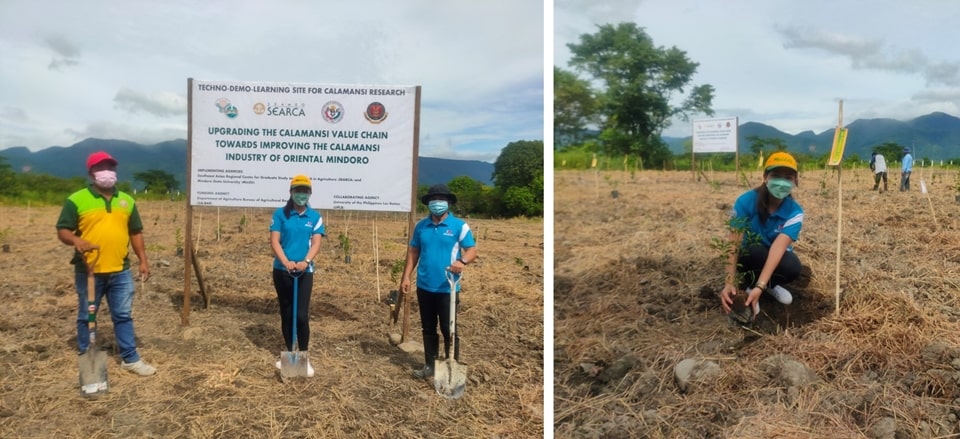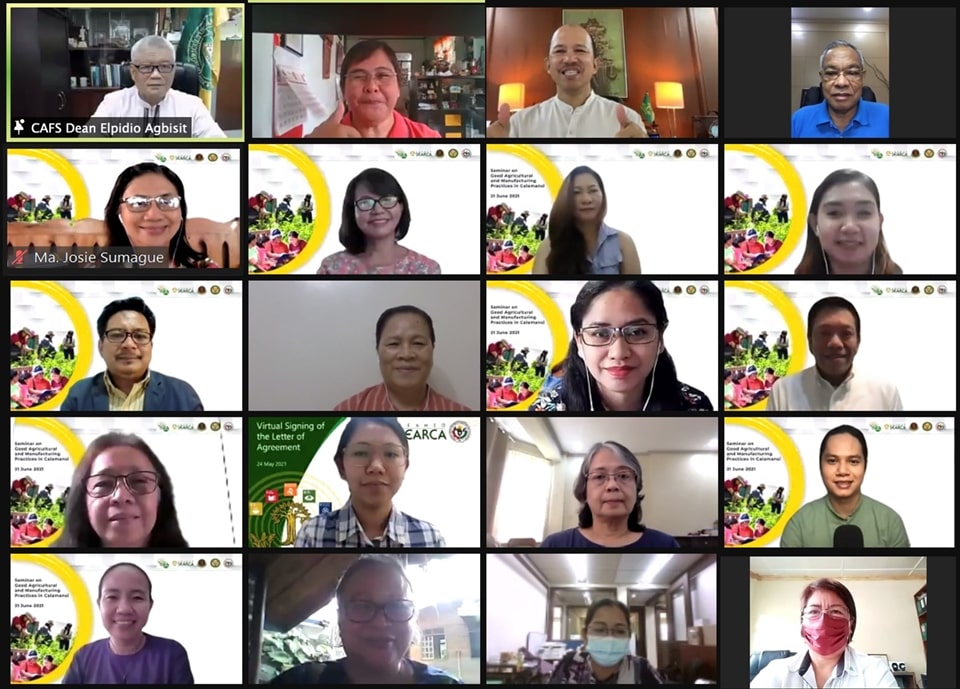A ceremonial turnover of the techno-demo-learning farm for calamansi research in the Mindoro State University (MinSU) was held on 21 June 2021.This was followed by an online seminar on Good Agricultural and Manufacturing Practices in Calamansi hosted by the Southeast Asian Regional Center for Graduate Study and Research in Agriculture (SEARCA) via Zoom and SEARCA's Facebook page.
 MinSU leads the planting of calamansi seedlings in the established techno-demo-learning farm for calamansi research.
MinSU leads the planting of calamansi seedlings in the established techno-demo-learning farm for calamansi research.
The techno-demo-learning farm was established in MinSU through the SEARCA-implemented project “Upgrading the Calamansi Value Chain towards Improving the Calamansi Industry of Oriental Mindoro” with funding support from the Department of Agriculture - Bureau of Agricultural Research (DA-BAR). The demonstration farm is one of the project outputs aimed at promoting faculty and student exchange for research, development, and technology promotion and transfer. Dr. Glenn B. Gregorio, SEARCA Director, turned over the demonstration farm to MinSU to contribute to furthering the calamansi industry of the province. Dr. Levy B. Arago, Jr., MinSU President, accepted and expressed his gratitude for giving the university the opportunity to extend the technologies in calamansi production to the farmers and other stakeholders in the province. Also present during the turnover ceremony were Ms. Julia Lapitan, Assistant Head of the Research Coordination Division (RCD) of DA-BAR and Dr. Elpidio M. Agbisit, Jr., Dean of the College of Agriculture and Food Science (CAFS), University of the Philippines Los Banos (UPLB).
 The turnover ceremony of the techno-demo-learning farm was participated by officials from SEARCA, UPLB, DA-BAR, MinSU and the rest of the Project Management Team.
The turnover ceremony of the techno-demo-learning farm was participated by officials from SEARCA, UPLB, DA-BAR, MinSU and the rest of the Project Management Team.
The webinar on good agricultural practices (GAP) and good manufacturing practices (GMP) aimed to address the pain points in each sector of the calamansi value chain and provide recommendations based on the results of the studies conducted by the project management team (PMT). It was participated in by the calamansi growers, processors, and technical staff from the Provincial and Municipal Agriculture Offices in Oriental Mindoro, together with the rest of the PMT from SEARCA, UPLB, and MinSU, and other key stakeholders of the industry. Study Leaders and experts from several institutes and units of the CAFS-UPLB, Bureau of Plant Industry- Baguio National Crop Research, Development, and Production Support Center (BPI-BNCRDPSS), and Department of Trade and Industry-Exports Marketing Bureau (DTI-EMB) served as Resource Speakers.
Session 1 of the webinar, on GAP, was started by the presentation of Dr. Juliet M. Ochasan, Supervising Agriculturist of BPI-BNCRDPSS, on the protocols for the production of clean and disease-free planting materials and nursery management. Dr. Flor A. Ceballo and Dr. Filomena C. Sta. Cruz, Study Leaders and Professors from the Institute of Weed Science, Entomology, and Plant Pathology (IWEP), shared the project accomplishments and recommendations in support to Integrated Pest Management (IPM) in calamansi. GAP in calamansi production such as nutrient, water, and canopy management were presented by Technical Field Mentors and Assistant Professors Leslie Angela L. Roces and Bryan V. Apacionado from the Institute of Crop Science (ICropS). Dr. Josephine U. Agravante, Study Leader and Research Professor from the Postharvest Horticulture Training and Research Center (PHTRC), shared the perspectives towards improving postharvest handling.
Session 2, on GMP, was on compliance to standards and about market potentials of processed calamansi-based products. Dr. Ma. Josie V. Sumague, PMT member and Assistant Professor of the Institute of Food Science and Technology (IFST), shared the results of the assessment of the compliance of the calamansi processing facilities in Oriental Mindoro to the current GMP (cGMP). Ms. Agnes Perpetua R. Legaspi, Assistant Director of DTI-EMB, shared the calamansi global market landscape to the participants. Lastly, the results of the market study and the recommendations towards improving the calamansi value chain was presented by Dr. Matilde V. Maunahan, Study Leader and University Researcher II of PHTRC.
Ms. Christine M. Pine, Provincial Agriculturist of Oriental Mindoro, and Dr. Christian Anthony C. Agutaya, Vice President for Research, Development, and Extension of MinSU, together with representatives from the farmers and processors in the province shared their perspectives and commitments towards improving the calamansi industry, following the initial gains of the project. Ms. Pine acknowledged the importance of the demonstration farm as this will showcase appropriate technologies and the results can be used as inputs to the Annual Investment Plans of the local government units (LGUs). Meanwhile, Dr. Agutaya hoped that this undertaking will help them to continue MinSU’s contribution to sustainable development and economic recovery amidst the COVID-19 pandemic.
Dr. Edna A. Aguilar, Project Leader and Professor of ICropS, and Dr. Pedcris M. Orencio, Project Proponent and SEARCA’s Program Head of Research and Thought Leadership Department, expressed their heartfelt gratitude to all the stakeholders and the staff that the PMT had worked with during project implementation, stressing that this project is not the end of the research interventions of UPLB and SEARCA, but this will also open windows for future collaborations to upgrade the calamansi value chain and improve the calamansi industry.